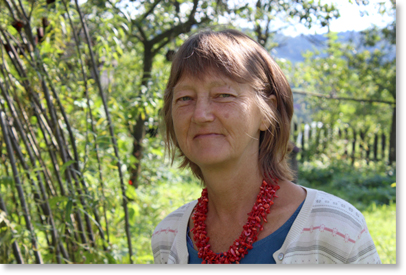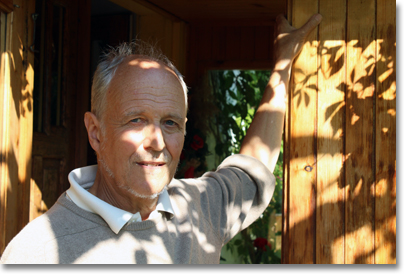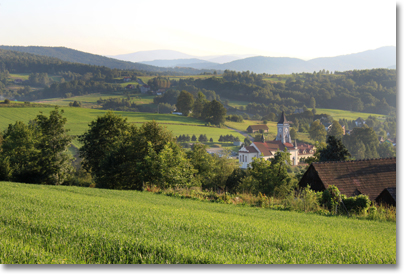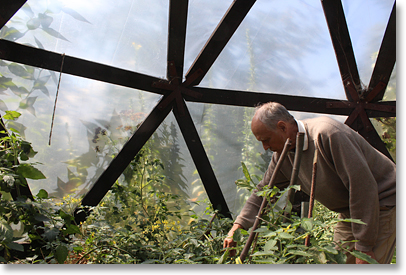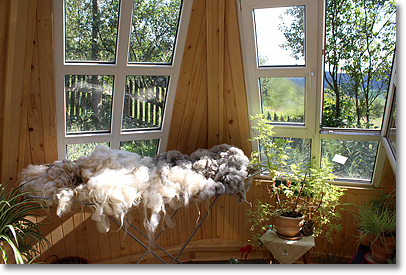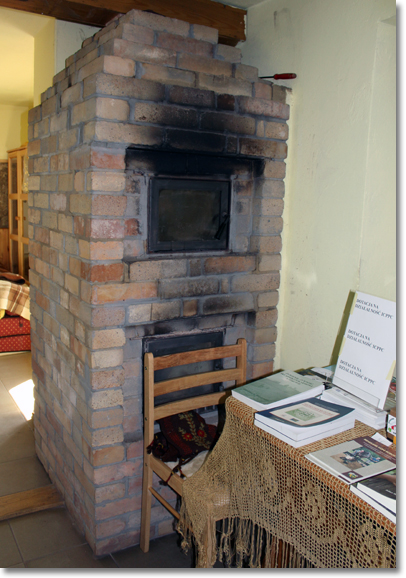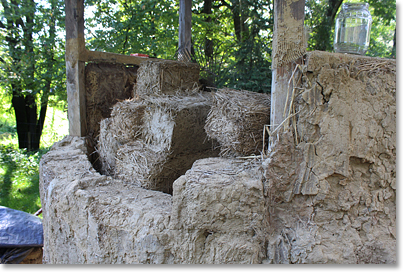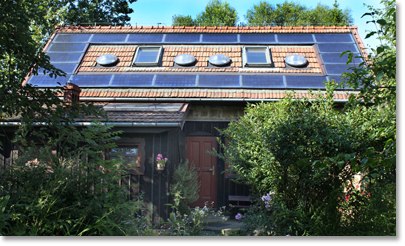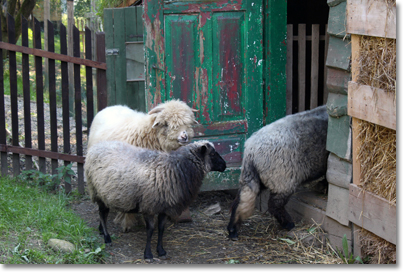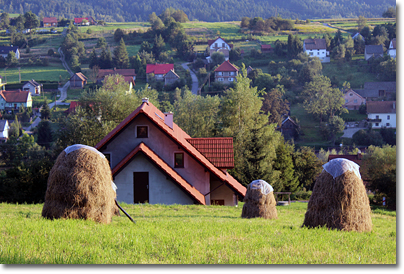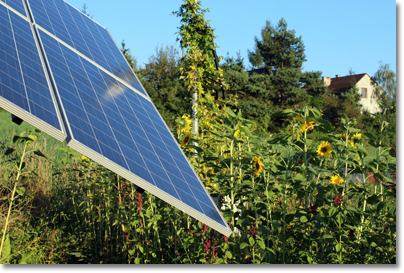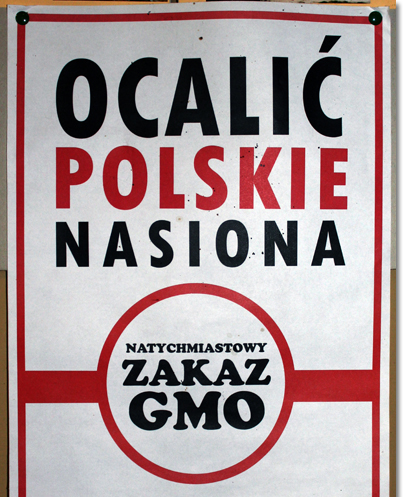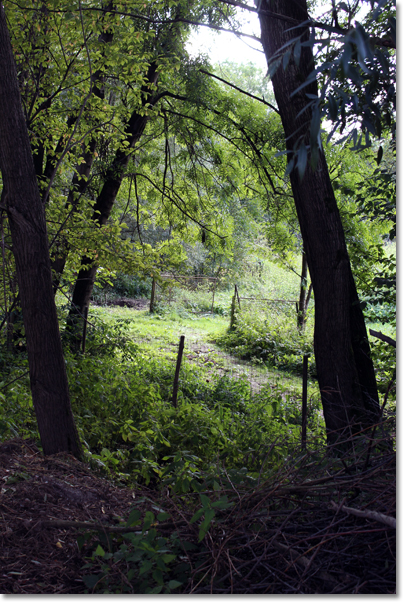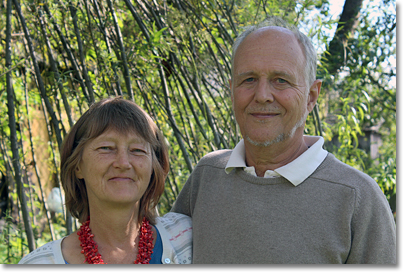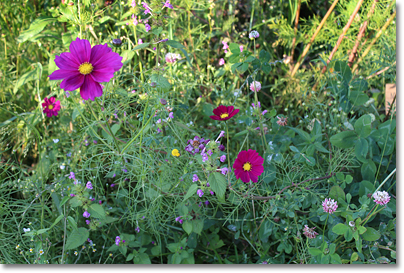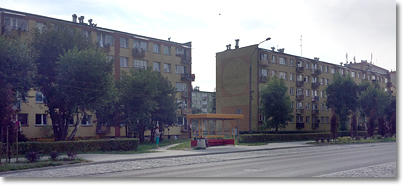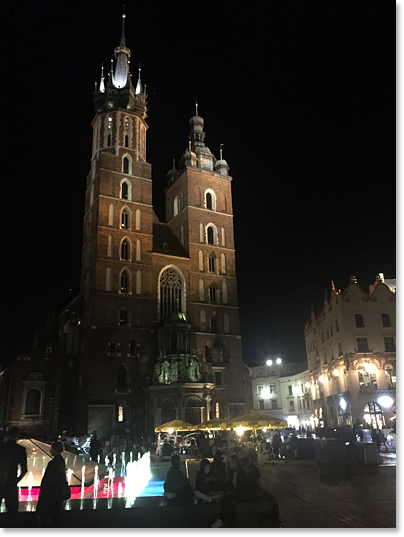|
Interview with Jadwiga Lopata and Sir Julian Rose
Sir Julian Rose is also a co-director and founder of the International Coalition to Protect the Polish Countryside. He is from the United Kingdom, living in England and Poland. “I have a farm in England, organic farm which I started converting from conventional farming in 1975 at a time when there were very few people doing it. ... I was also involved in a lot of entrepreneurial organizations to support small and medium-sized family farms because I saw them under enormous threat, actually falling in a hole between conventional large-scale monocultures, pesticides and the organic. The ordinary simple family farmer (is) disappearing. On June 13, 2017 Jadwiga Lopata and Sir Julian Rose added their signatures to the Belweder Declaration: The Charter of Real Farming and Real Food. This interview was conducted and later edited by Nic Paget-Clarke for In Motion Magazine on August 30, 2016. The interview took place in the home of Jadwiga Lopata and Julian Rose at the ICPPC Ecocentre in Stryszów, in southern Poland. Quick Links:
Part 1: The most important part of my life Jadwiga Lopata: ... I didn’t mention the most important part of my life and my most important role -- that means being peasant. Being peasant and being a small family farmer. I grew up on a small family farm in the next village and that was the best and the most influential, I would say, training, of my life -- growing on this small family farm, a very biodiverse farm which at this time no one called organic, but it was organic. And then I got this place which is also based on a piece of land and I am still farming here and growing my own vegetables and fruits and having a few small animals which are helping us with giving manure to the vegetables. We are pretty much seventy percent self-sufficient here in food. The rest of the food we are getting from local farmers, so we are not going to the supermarket at all. The knowledge of the generations In Motion Magazine: In one article I read, you said there are one and a half million self-sufficient small-scale farmers. Is that in southern Poland or all of Poland? Jadwiga Lopata: It’s the whole of Poland, actually now it’s a little bit smaller, 1.3 million, or maybe 1.2 million because of already, unfortunately, being in EU (European Union) is causing a lot of problems for small and middle farms. Many of them fail and so we have less than before going to EU. The size is up to 10 hectares, and we are speaking of the whole of Poland, but, of course, the biggest number of small family farms are in south Poland and east Poland. Middle Poland and the west side of Poland (have) the bigger farms. Processing units and EU regulations In Motion Magazine: What has being in the European Union done for small and medium-sized farms? Jadwiga Lopata: That’s a big issue and unfortunately a very sad scenario because EU is not really interested in supporting small family farms, small biodiverse family farms. I am speaking about organic and traditional farms. I mean very bio-diverse farms where they use traditional methods of growing food, which is based on the knowledge of the generations, which is very close to organic. They are not certified. Sometimes they are even better than certified organic farms because certified organic farms often have a tendency now to go monoculture. Too big, too much processing, and so on. (But) organic is nothing else (than) the wisdom of generations, taken from past generations’ grandparents. It’s all based on this wisdom of the past. So, what’s happened, before even join to EU -- there was a big push (to be) under EU regulations for all the small enterprises: like milk processing, you need, or vegetable processing, you need, fruit processing, you need (regulations) which were local, in each community. Communities in Poland are made up a few villages – like here, we are now in the community Stryszów, which is five villages. (So) each community had at least one of these kinds of processing units, or more in bigger villages -- in each village there was this processing unit. Like for example, here, there was a milk processing unit and all farmers who had cows, they could deliver milk down in the village and they could be even a member of this processing unit, getting a little bit of extra money, not only for milk but also extra money for selling. And they were producing butter, and cheeses, and yogurt, all products from milk. And other villages had like fruit processing, vegetable processing, and so on. It was very common all over Poland. It was very characteristic that when you travelled in different parts of Poland you get slightly different tastes of cheeses, whatever. Every soup done by a farmer lady had a different taste. It seems like the name is the same but the taste is different because it’s different heart, different ingredients, add something more, and so on. It was fantastic to travel all over Poland and get this really different taste of different food -- very good quality. (When) I was young, I spent my youth traveling all over Poland and really this food which we were getting as a young person -- I am now over 60 -- it was like high quality organic food is nowadays. So, this is really ridiculous what has happened with the tendency to destroy this very good quality. One by one The EU regulations are forcing to close, one by one, these processing units under the name that they are not safe enough, hygienically, or whatever. That is only an excuse. I don’t believe it at all. Like in the closest town when I was growing up in Kalwaria: there were three butchers, three bakeries, and a small processing unit for vegetables. All products which farmers were producing were done locally and local people were buying these products. And no one died. People were much more healthy than nowadays, getting all this junk food from supermarkets which are having so many stamps, labels, and passing so many tests, supposedly. But they are simply killing us, gradually. After joining the EU they gradually closed these enterprises one by one. It was just the first step to finish these independent small family farmers because as these processing units were closed they had no means to sell. They could sell a little bit to local people but how much can you sell without being able to process it, for example – cheese? One by one. I came here seventeen years ago and it was the same in every village. (There were) like fifty, seventy cows and now there are five. Julian Rose: No, you won’t. It’s frightening isn’t it? Working against Polish farmers Then another -- as we step to EU -- came this crazy regulation that, for example, if you want to sell milk you have to have quota and you have to have a special area where you, for example, milk the cow with all these hygienic wools, and so on. When you have two, three cows, people just used to hand-milk. You don’t use a machine for two or three cows because the cost of buying this machine is much too big for to cover. How many years you will have to work for to cover the cost only of this machine and then prepare this special place, and so on? And there was never a scandal of food sickness or whatever, nothing. You don’t hear about this. As I said, people were very healthy, whereas nowadays, you hear a lot of scandal and problems with health, and buying food in the supermarket -- supposedly to have all this permission and passing all these regulations. So, there was this kind of protest that they closed 60, 70 percent of these small processing units all over Poland -- so farmers cannot sell the products. That’s one reason. And the other reason, the EU itself is not really making it so hard to sell food which is processed -- but, EU has delegated that each country has to make regulations for itself, for its farmers. If I am, for example, having apple, I can sell apple with Polish regulations. I can sell raw products. But, if I make juice from this apple -- I can’t any more. It’s illegal product because if I want to do it legally I will have to build up a separate building, fulfill all conditions -- again, regulations -- as (if it were) a big factory farm which is producing a big amount and which is producing every day. I am a small farmer and I could have, let’s say, a hundred, a thousand jars of this juice. That’s maximum. And I can sell this seasonally and that’s all. I can sell regionally, on a local level, a bit more maybe to Krakow. But I can’t, I will not go to another part of Poland because it’s too expensive to travel to go over there. EU regulations, in this case, they do make like open door so that small farmers can do it, but the Polish government makes regulations (so it’s) impossible. We are now in the middle of this campaign to change these regulations. And, of course, there’s this question of why the Polish government would be working against Polish farmers. If they would be able to sell locally Yes, and the answer is pretty clear in Poland. We have over a million families, small, middle farmers. They are independent. They are not going to the supermarket. They feed their family. They feed the neighbors and they (could) feed much more because they can produce much more food if they would be able to sell locally. If I try to sell this product I am risking that I will get some fine, quite a big fine compared to the price that I can earn from selling. That’s why it’s stopping many farmers from selling outside the farm. Julian Rose: They are a threat to the corporate farming agenda. That’s how this process is because before joining to the EU we made quite a big effort to alert Polish farmers. We were not against joining the EU: we were against joining on very bad conditions for Polish farmers because it was obvious when we joined on these conditions there would be this process of destruction. And no one could believe us. They kept asking how they would do it. And I said, “By introducing regulations” -- by destroying the infrastructure of processing. And that is exactly what has happened because it was repeating, it was happening already in the other countries. We had this information from other countries. The scenario was exactly the same: the tendency to destroy the small, middle farms in favor of introducing big farming. And again, I am not against the process of slowly making a farm larger, but it’s a small natural process. And then, when I was speaking with farmers and asking them, which kind of size of farm would be the best for you - that will be economical enough and that you can handle -- and that size was between fifteen, twenty, twenty-five hectares maximum, because that’s what a family can handle. And that’s what is really good income. As I was mentioning, when I was running (for) ten years this European Center for Ecological Agriculture and Tourism, in short ECEAT, whose idea was promoting organic farms through tourism, basically because farmers could then sell the produce, we invited tourists and they can sell their products to tourists -- then hopefully tourists will contact them permanently and buy more from the farmers. And that’s exactly what was a very practical project. It was showing that this can work very well economically. From one side, produce good quality food, from the other side have some additional income -- like for example from tourists; like, for example, here, we have here from education; like for example from doing something, handicraft or whatever, some nice things for selling. Or, even as we are promoting here: clay and straw houses, ecological houses, making bricks and selling to those who want to build up their houses. There are really a lot of possibilities. If the policy will be going in this direction we can have paradise because we will save good quality food, beautiful biodiversity, beautiful culture. We don’t destroy our communities. We still have in Poland very lively communities. We still have them but it’s progressing slowly and is less and less active. There are many places, many villages where young people are in England and all their parents are sitting at home and thinking, “Who will take over farm from us?” If the policy will be not changed then there will be just empty villages, slowly, as happened for example in Portugal. Julian Rose: France as well. Jadwiga Lopata: In France, yes. Thousands of empty villages because people went to the cities trying to survive. They were told that they would be having better lives than in the countryside. We are just, again and again, commenting because we were coming back yesterday from Podkarpackie, another province, and passing a flat (high-rise apartment) area in the cities that’s all people who were living in the countryside. They are landing up in these big flats areas -- an awful place. And awful thoughts to think about this -- that if someone who grew (up) on peasant farm and used to have this space and be with nature and animals and suddenly (they) end up in these (flats) -- for me it’s like ending up in jail. It’s an incredible thing to think. And then they are taught, the propaganda is so strong, they are telling you, “All this is your future. This is your career. You make big career because you will end up in the city.” Awful. In northwest Poland In Motion Magazine: And there is a land-grabbing process as well, particularly in northwest Poland? Jadwiga Lopata: Yes. But now from 1st January there is a new regulation, which is a bit stronger ... Julian Rose: Blocking it. Jadwiga Lopata: Blocking. But it was really very bad, especially happening in northwest Poland. Julian Rose: Near the German border. Jadwiga Lopata: Basically, the west side of Poland (is) where many foreigners, many corporations, different groups of corporations, were buying thousands and thousands of hectares of Polish land. No one knows really how much is in the hands of foreigners because it is hidden under joint ventures between Polish and foreigners. But this (is a) very easy way for land to be taken by foreigners because it’s enough that the Polish person withdraw himself and then the land is in the hands of foreigners. That is why farmers were protesting very strong, especially in this part of Poland, the northwest part of Poland, to stop this process of grabbing land. The official regulation was that if you want to buy land in Poland, agricultural land, you have to have permission of government, permission of Minister of Agriculture. And so Minister of Agriculture is giving report that he had 200,000 hectares and the farmers who were living in the villages, they were saying, “I am surrounded by foreigners. There is no land anymore. I am alone as a Polish person.” And they were calculating there was at least 2 million hectares in the hands of foreigners. The process was so brutal. Some of the farmers are bigger. There are farmers with 200, 500 hectares, up to 1,000 hectares. Often the situation was that half the land was their own, and half the land was government land that they were using based on a contract. So, the government, if the contract was finished, they just stopped (leasing the land). They don’t go on any more with the contract, or they even break the contract in many cases. They, that means the government, paid the fine to the farmers for breaking the contract and sold the land for a price which was completely impossible for Polish farmers. And that put Polish farmers in very bad situation because many of them, almost all of them, bought very expensive equipment based on a loan in the bank which was based on the calculation that they have all these pieces of land, including this which they were renting from government. And, suddenly, they don’t have half their land, which means they don’t have enough income to pay to bank. So that means the bank is immediately sitting on their farm and taking land from them. That’s why it was (such a) big protest, and, really, day and night farmers were standing in front of governmental agency, months and months, winter, cold weather, freezing. We were joining from time to time, in Szczecin, which was the main place protesting, and around Poznan and Warsaw. So, finally, when this new political party got in power, PiS (Prawo i Sprawiedliwosc / the Law and Justice party), which is now the main government party, they changed this regulation. They blocked this massive selling. But still there are some small holes -- this time through church and religion organizations. They were excluded. They were not under this very strict law so they can do it. In Motion Magazine: I was under the impression that the new government was kind of a right-wing government. Julian Rose: It is. In Motion Magazine: But they used this to get elected? Do you trust them? Jadwiga Lopata: That’s a very good question because this is the government and this political party -- because it’s just one political party now, they don’t need coalition -- they are strong enough and have enough members to create government: that’s the political party called Law and Justice. And, during all these recent years -- how many years it will be? -- 2006 was the last time they were in power, so ten years -- they were hand-in-hand, arm-in-arm with us fighting for the same issues: stopping grabbing land, introducing legally banning GMOs (genetically-modified organisms), and freeing farmers for local selling of small-scale produce. There were three main issues and every time when we were everywhere with farmers ourselves, organizing different events, (they were) arm-with-arm saying the same that we were saying. And now they are in power and the regulation about selling land is better, but not really the way that farmers were wishing. So, now farmers are again starting to prepare themselves for protest. They are now working on changing this regulation, the farmers. Also, the regulations on GMOs completely caught us because suddenly the political party is starting to propose regulations that will open Poland for planting GMOs -- and we couldn’t believe. There are two Acts now on the agenda. One is an Act about animal feed. (Editor: The ban on GMO animal feed was originally introduced in 2006 by what is now the Law and Justice party but it has been repeatedly delayed in negotiation by Law and Justice, then by the government of Civic Platform and the Polish People’s Party.) And in between time we don’t have on the market (any) animal feed without GMO. It’s all with GMO. So, if farmer is not producing it himself, he’s buying. He’s buying food which is GMO for animals. So it’s a very bad situation. … And (now) we have this government which we were hoping so much (for) and fighting with us so much when the other was postponing this and not banning animal feed. (But) what they are doing just now, because it is ending in 2017 again, they say, “We have to postpone another four years without any percentage without GMO.” Again the same. We can’t believe what is happening. Julian Rose: It shows that the major lobby group behind GMO is associated with animal feed because there is relatively little food on the market which has a lot of GMO in it. It has traces, of course, but in animal feed you’ve got a huge market, all of Europe. It’s exactly the same problem in England. All the animal feed is GMO, unless a farmer specifically demands having something else, and then you get charged extra for getting something which is pure. Jadwiga Lopata: This is also about big money. We are speaking about maybe 4 billion zlotys (Editor: Polish currency), which instead of corporations, Polish farmers could earn. And that is how they are cutting Polish farmers’ income because if Polish farmers would produce traditional food which used to be before GMO came -- when animals were fat naturally with no problem, (and the) quality of meat, products from animals were better -- then the farmers (would be the ones) who will be having this four billion income. (But now), all is going to international corporations, and all is going outside Poland, and the economy of Poland and the countryside economy is just going down and down. And the other act which is a GMO Act also, this political party which was fighting arm-with-arm with us for GMO free Poland, now they are proposing a designated area for planting GMO. So we were just like, “What!” … We have to prepare for next battle. This is ten years hearing them declare that they want GMO free Poland and when it’s coming to practice, when they got to the power again, they are doing something else. It is politicians -- you never believe politicians. You never trust politicians. That’s the one lesson which we have learned for sure. In Motion Magazine: In line with that, in the southern part of the country, where the processing plants have been destroyed, are farmers selling their land? Or do they just have a lot of land and there is nothing happening on it? Jadwiga Lopata: There is both. (There is) a lot of land where this has not happened much. And (there is also) slowly selling bit by bit because they have to somehow make a living so they just sell bit by bit and have some money for to live. It’s a very dangerous path. In Motion Magazine: Are some farms getting larger or corporatized? Jadwiga Lopata: South Poland, well not all south Poland but specifically Malpolska, in which we are located, and more East side, Karpackie, it’s going to the other farms. (They) have not yet (been) discovered by corporations because it’s hilly area and small farms. We have average size in Malpolska of four hectares, below four hectares, and Podkarpackie, below five hectares. Julian Rose: (However) we have evidence of farmers who are being approached by people who are, for instance, contracting them to grow maize on a large scale. You get hundreds of small farms all suddenly growing maize who never would have thought of growing maize before. It’s a crop which doesn’t suit the soil. It doesn’t suit anything. And suddenly there it all is. Jadwiga Lopata: This is the only contracted grain which can secure money. They plant and then they have secure market. You see how all this is working to make them used to maize, because in Europe the only GM plant so far which is legally allowed to be planted is GM maize. Only one variety of maize which is legally allowed to be planted on the fields. It is country by country banned, not allowed. In EU, generally, in all countries, just 1.4 percent land is GM maize. If you think about all the area of maize, it’s only a little bit over 1% is GM maize. It is (allowed in) Spain and Portugal -- not the other countries. But it is threatened because they push and push and push because Europeans are very much against GMO. There is a very strong movement. That is why it is not developing. But it is a permanent push. We started to campaign for GMO Free Poland in 2004. And we have ups and downs, ups and downs, winning battle and then a corporation coming back with some other back door. And then we are again stopping. It is really a very strong opposition. We started with a so-called GMO Free Zone in 2004 because when we joined to EU we inherited from EU the same regulations concerning GMO. Before, we had very strict regulations not allowing GMOs. But when we joined, there was this maize which was opened for cultivation. So, learning from England, and other Western countries, we started to create so-called GMO Free Zone and we encouraged a few farmers here and a colleague who was mayor of a few communities, so he could declare all these communities a GMO Free Zone. That’s how we started. And then this colleague became senator and with him we created all of his province GMO Free -- Podkarpackie, which is a big province. (Poland has sixteen provinces.) And then we invited him to here, to Malpolska, speaking with the board of Malpolska, and encouraged them to create GMO Free Zone Malpolska, and that has happened. Gradually other provinces (agreed). It took us two years. All provinces in Poland declared that they wanted to be GMO Free and that was fantastic achievement. But provinces have no right to create legal rights, regulations, so they all wrote to the government, to Minister of Environment, Minister of Agriculture. “We want regulations which will protect us so that our declaration to be GMO Free will be in force.” And that is what happened in 2006. We had very strong regulations and that was (with) this political party, Law and Justice. They introduced this regulation that you can’t plant GMO, and there will be this ban of animal feed, and so on. But they were in power only two years and then they were kicked out and (then) came another government which promised to keep policy in relation to GMO the same -- but they were opening (them) more and more and more. We (had been) 100% almost sure that we finally could relax and we had the same government who ten years ago introduced the ban of GMO – but that same government (Law and Justice), after ten years, is changing for opening Poland (to GMOs), so we again have to mobilize ourselves and stop this. A state of shock for corporations (For) all these years we mobilized Polish public and we had so many different conferences, events, protests, everywhere, everywhere, all over Poland, and national events. And we (had) managed to keep this regulation (so that) pretty much we are GMO Free. The first time, in 2006, when the government banned GMO there was like one year completely silent, feeling like a state of shock for corporations – that Poland banned GMO. They were prepared that Poland would be very easy victim: that we would be just not bothering, not aware -- because we were not aware. And that’s why we started with the province level, this biggest province, to work with authority, to make them aware, because we can’t just work (at the grassroots level), with the people, because it takes too long to educate public, and so on. And it was working. Now (the) public is much more aware, generally. Whoever is doing this so-called research, opinion poll, now it’s like 70% of Polish people are against GMO. It’s a pretty aware public. In Motion Magazine: Why do you think they are now opening Poland to GMOs? Julian Rose: They always claim that there’s a regulation under the European Union which they are conforming to by doing this. Where it starts is the World Trade Organization -- it’s called free trade. As long as it’s not considered seriously dangerous to public health, you have no right to ban it. On the other hand, the European Union has been quite strong, (although) not very strong, on holding off the flood from America of GMO, under enormous public pressure, because all over Europe it’s 75, 80 percent who don’t want it. So they can’t just open the door. But they covertly open it because the organizations responsible for checking, like the health and safety organizations of the European Union, are full of people who are paid big money to be very flexible. And they only ask for the health and safety position of the corporations themselves. They don’t take any independent research and the corporations say there is no problem. So at that level they try and push them through. That’s been going on for years and years and America has been getting more and more frustrated by it and the Europeans are also partially frustrated because they see it is not fool-proof, it’s dangerous, it’s leaky. Right now it’s moved into a situation where the exposé of what it is really all about is growing. More and more people are aware that this is not only about food and health. This is a whole attitude about patenting the food chain itself. Owning the food chain, quite literally, by corporations and governments who always work in tandem. People are realizing now that they always work in tandem. They didn’t understand that before. Therefore the only means which the corporations didn’t have in the pro-GMO lobby, including the professors, academia, is laced with money to support GMOs and they read straight from the Monsanto handbook. We’ve been at many, many conferences where they literally read from the Monsanto handbook. But now they are finding it more and more difficult to find reasons for opening the door. Now they are claiming, again under some European ruling that they have to open, give the possibility for specific situations where at a certain level, at the local level, the local community, they would have the right to create GMO Free Zones but they make the regulations very tough. The theory is that none will ever do it because there are so many blocks to actually doing it -- that no one will ever attempt it. Jadwiga Lopata: … Polish consumers are cut off more and more from real food for two reasons. (First, there is) this so-aggressive propaganda promoting this life-style based on supermarket. It is very, very aggressive propaganda so people are just like, “Wow, we have to be part of modern” and go to the supermarket, not somewhere to the countryside for farmers buying some simple food. And, from the other side, there’s just these difficulties that there is no good quality food in the shop. You have to go to look for the farmers. You have to organize yourself. You have to create some group of people to go to the farmers and buy from the farmers directly. So, this makes for consumers even more difficult. And that’s a fact because Polish people used to eat very good, and recently, let’s say these last twenty years, because of more and more it’s food based on supermarket, very bad rate of cancer growing rapidly, and other sickness, and the children are growing puffy – never happened, never happened. We keep saying that when I was in the school we had one person who was just a little bit more bigger and now you have … Julian Rose: … fifty percent. Jadwiga Lopata: And the same (with) allergies. No one heard about allergies among children and now every second, or even more, child has allergy for food – cannot eat this, cannot eat that. Not surprised, they just protect themselves from the junk food. Traditional markets In Motion Magazine: What about the tradition of local markets. Are they gone? Why did you feel you had to actually write a law about direct sales? Jadwiga Lopata: I will quote you what is in the Polish law now, that farmers can only sell his non-processed food (in a) market which is having no shelter, no roof. Can you understand why? So, when it is market and you have roof then you are not allowed to sell. In Motion Magazine: They are outlawing markets? The traditional markets? Jadwiga Lopata: Traditional markets, when its rain, cold, and so on, people are bringing some umbrellas, tent, and so on. According this regulation they are not allowed to do it – even this. In Motion Magazine: What are you proposing in your bill? Julian Rose: If you go to the local shops in the village, Stryszów has eight small shops and no supermarkets, so it’s a nice example of what could be. Tiny shops some of them, (but) absolute rubbish food. It’s all coming – no one knows where it is coming from. Jadwiga Lopata: Because they can’t sell their local food. Julian Rose: Whereas under communism they would have been all local foods and nothing coming from the outside. If you want to look at it in the political spotlight, far superior under communism, people getting a decent diet. Farmers were paid on a regular basis, a very steady fee. All gone. And if you talk to them, they all say, “So much better then”... In Motion Magazine: That was one of my questions, I don’t know how much you remember of those days. Julian Rose: She remembers it all; it was most of her life. In Motion Magazine: How do you sum up that period? Jadwiga Lopata: You see, because I was living in communist time and I am living in capitalistic time, I have very good comparisons. During the communist time, even many members of my family, my uncle, and so on, went to USA for finding money, living, and fortunately my mother never wanted to go, fortunately for us now. I can see this. There was many, many good things during the communist times. Of course, there were things which were not good, but there were many good things which we give up. First, I was thinking it was because we were stupid but as more I am aware I see that it was proper policy designed much more ahead and pushed us in this direction. What I mean is, we had very good education system, free. Of course, it was major mistake to educate public then public is making revolution. (Laughs) But we had very good education system. There was very little unemployment. Of course, people were not getting big salary but everyone had some job, including women. The salary was not so big but there was very good social health. As I said, education -- children had for free. And then you can go for holiday for tiny money or for free because your factory was helping you. You had free care of doctor, all kinds. Nowadays you have very basic (healthcare) and money -- you have to pay by yourself. You had free medicine. And then, concerning farming, the farm was a contract system so, for farmer, whatever he produced he could sell. He had security that he will sell. And that’s why there were all these governmental processing units. We (had) resources to process (food) because they knew how much they will have. And, even, there were governmental regulations that according to the size of the farm you have to produce this and this amount for government. I remember because my parents were producing for government -- this and this amount has to be. They have to grow one pick (harvest) and sell (to the) government and grow this and this. We had fruit -- this and this amount of fruit to sell (to the) government. (It was) always contracted. (It) was very secure from the point (of view) of farmers that whatever he produced he will sell. The attempt to destroy the small and middle family farms Of course, there were difficulties to get different materials. For example, building materials were very difficult to get. I don’t know how it was with machines. It was probably expensive, but then there was this system that the farmers had a collective pool of machines, which was a kind of cooperative, and then every farmer can use the machines. The first thing that was destroyed was this cooperative system of machines, saying that this is old-fashion, and so on. And some people which were very close to graft, all these machines, this was privat(ized), and this was finished -- and so farmers had no access to the machines. The second, as I said, was all the processing units were destroyed. This was the attempt to destroy the small, middle family farms -- the system which was a base for Poland to be independent, and a base for good quality food. So, there were many things which were very good during the communist time. One thing of course, which was very bad, was this limitation that we cannot go abroad. That was developing this big, big image that the Western countries, USA, Canada is paradise and whatever is coming from these countries is great and we don’t value this, what we have inside our country. That was a big destructive element -- people living in this dream, wanting to go abroad. I had a chance to travel during communist time and the more I was travelling the more my eyes were opening and I valued more and more the Polish countryside. This, what we have. And also, you know, during the communist time, all these processing units, big ones, were still in the government -- it was owned by the nation. And now all is in the hands of corporations. All was sold in the process. There was thought, in the main, that we have this big debt and the debt was tiny compared to the debt that we have now. The debt was so tiny that the debt now is what we have percentage to pay, versus the debt which we had. And now it is the percentage which is growing every year. When I observed, and I see when I analyze now, it was a policy to prepare -- to open Poland for corporations so that they can grab whatever there is for to grab. So, the old factories went. All the electricity company went. Now it’s preparing for to sell the water supply system -- supplying cities and villages. It is prepared for to sell to corporations. And the land and the forest are the last resources that are in our hands: the majority still are in Polish hands (and are) in danger to be taken. If we allow them then we will be slaves in our country completely. We are already slaves. Also, (as to) why Polish farmers have problems, these big processing factories are in the hands of corporations. Often, during this process of buying, there was big bribing and speculation because they were sold for half price, many of them. They often bought them (in order) to close them that they will not be competition. You see? Like the steel company. They just bought them for to close them. In farming, I remember the sugar company. They bought them for to close them that there will be no competition producing sugar. And that of course changed (the situation for) all farms which produce beet for sugar. They lost market. No one is buying from them. And this corporation Smithfield, they bought several cooperative farms in Poland. I think they had maybe sixteen pig factory farms, and they bought also processing units, a processing factory. And they use the Polish name because they know the Polish people most likely do not know they are not any more owned by Polish people but by foreign corporations. In Motion Magazine: Why do you think people did want to change away from the communist system? Jadwiga Lopata: That’s what I said, because we developed so big a dream -- that it is so bad in Poland, and communism, and it is so good in capitalist countries. Of course, we were not aware. When one compares what was with what is now then you see more clearly and I think neither way is good. It should be neither way. (This) was attempted by Solidarity and I think there is maybe another chance to do this in Poland with farmers now. Julian Rose: That’s what we are always really hoping -- farmers and aware consumers, because you have to have both. It’s never going to be just one of those. It’s going to be them working together but farmers will have an extremely important part to play because they will be the only people capable of offering another lifestyle to what is a rapidly disintegrating disaster run by the status quo. It’s so full of disasters today that people are very frightened. And it takes usually fear, unfortunately, for people to start looking around for other options. Jadwiga Lopata: You see why people wanted to change because there’s the aspect of fear and control of communism and people were thinking we will be much more free under capitalism and as I underline again, we were not aware of what will come with capitalism. Now, looking from the perspective of time, I can see very clearly that there were many things very good and we shouldn’t destroy them. We should bring them to a new system and we shouldn’t take many things that were very bad. And one crucial danger of capitalism is just these corporations, which are taking completely everything from the people. ... corporations are gradually going to the food industry and they want to control our lives completely. It’s very well known that if you control food and water you control everything. That’s why it is a major moment now in Poland. Unfortunately, there is big bribing going on, not only in Poland, but everywhere, and we know politicians are going very well with corporations because this is bigger money and they don’t care about their own societies. That is why society has to rebel and has to care about itself. That’s why it is so important -- small family farms, or middle family farms, existing in Poland. That’s why it is (such a) big battle against them (the corporations) -- for independence. (For) food security. Farmers (have been) feeding Poland for ages. It was the farmers, the peasants which were feeding Polish people and produced much more food and we can do the same -- produce much more food which will be sold abroad because we have enough land. We have enough good farmers with wisdom about how to produce food and not based on huge machines based on huge amounts of chemicals because if one decides to go this way then you destroy this that is most valuable. You destroy biodiversity, the health of the nation. You destroy independency. You destroy good quality food. Everything you destroy. So, we are at the point when we have to protect this that is much more valuable, what is left. Not to repeat the same mistake, which is (what) all these Western countries did, that all countries are pushed to, and they are pushed by big businesses. It is nothing to do with safety of food; nothing to do with quality food; nothing to do with caring about people. It is nothing to do with this. It is about money and power only, from the side of corporations. And if government is going with corporations, that means they are the same. Jadwiga Lopata: Yes. A very interesting question and a very good question, actually. We keep observing, after maybe five years of our involvement (in efforts) to protect the Polish countryside culture and so on. There are many more women than men active on this field, around, for example, a project where we create so-called local coordinators. It means in different provinces some person who is trained by us in different aspects, especially related to creating this GMO free Poland, and this person is just running activities in his provinces. And there the majority are women and especially those people who became a permanent partner of ours, and keeping going on. Many people join and after one, two years they have enough. “No, I can’t any more. I’m tired,” or whatever. And the crew of women who stay are just women. They are very powerful, very strong, very determined, very knowledgeable, and very practical. The majority they are farming, as myself also, on bigger or smaller scale. Fantastic, really fantastic. I wish you can speak with them. Fantastic women who are determined to protect the real value of life and of course that is because women are dealing directly with growing children, the food, using their hands in farming. And they are very sensitive and they are perceptive so they observe the destruction which is going on around. That is why they want to say, “No. It is enough. We cannot give up any pinch more.” And we are thinking it is time for women. You see what happened so many years ago when I was involved, and wherever is some meeting on political level, governmental level, I’m coming and I’m doing this, “And again only men”. And I’m just expressing myself loudly like this. “How can it be good when it is so unbalanced? Where are the women? Why you don’t invite women for cooperation.” And I’m just saying this loudly. It cannot be good when it is so unbalanced. There is simply lacking women. Or another time, “Oh, I’m so lucky there is women.” So the best one is balance. I am not against men. I am very much respecting men, and so on, but men who are also having this sensitive part, they are seeing having this women part in themselves and are very open for cooperation -- giving the proper role of women. It’s nothing to do with feminism, because this is completely a movement which went on the wrong track, fanatic, and just showing the women like they can be worse than men having women in power. It’s about the beauty of women and dignity which women are carrying, and wisdom as a mother which is giving birth, and so on. We are in a very different position and we look from different perspective. So it has to be balanced between men and women, wherever. Of course you cannot force this, but there are enough knowledgeable and wise women to involve them in the process and to listen to them before you make any decision. I am just speaking generally. Definitely it’s women time. And I believe we will win, women, this battle for our children and grandchildren. Women have more and more courage Jadwiga Lopata: ... Julian remarks every time, he says, “Look, there’s a big machine, look there’s (heavy) equipment. How many women can manage with this? It’s all designed for strong men.” Isn’t it true? That’s why you have to stay with small, middle family farms and small equipment which women can also deal with. Julian Rose: Remember the Small is Beautiful book (by E. F. Schumacher; originally published 1973.) Jadwiga Lopata: Why I believe so strongly that we will win this battle is because we cannot go more and more so much bad because there are so many beautiful children coming now. They are very powerful and we should learn from children also, observe them, and see what they are bringing -- that’s a sign that the time of destruction is slowly coming to be stopped. Women have more and more courage. We got recently a fantastic photo, actually in USA, in one state where there is fighting against Black -- big movement. Some Black person was killed and Black people were having some protest and big, big army of police, very equipped, incredible, looking like automatons, protection here and protection here, the body. And then a beautiful lady came with a peace message. (She) stood against them. (They were) shocked by this innocent. I believe that’s what will win – heart, heart will win. And also, these children will ask more and more. They are growing with grandmothers educating them, and these grandchildren will demand for changing. I believe – strongly -- because there are more and more strong women who are ready to speak openly. Traditionally, women in Poland are hiding themselves behind men. They are having very good idea. They are the ones who are running farms, running family, having big input to all, but when it’s coming to decision, “Oh no, no, no, it’s my husband making decision and pushing.” I even ran a project a few years ago (about the) social economic strengthening of women. It was all about giving the women tools so that they would be able to make the decision, at least equal with the husband. Giving them more training and giving them more courage. And also giving them more tools. We were training them to make cheeses, hard cheeses, bread making, and so on. They are getting more strong. So you see, all over you see women much more stronger. That will happen. And also we have Mother Mary in Poland, a very strong belief in Mother Mary also a woman, this also symbolically -- it is like equal to Jesus. Sexual aggressivity That’s also when you speak about communist time -- women were having much more respect and equal rights. My shock, when I went first time to U.S., was observing how I was thinking this was supposed to be free country and the women were much more dependent on men, very prudish (patriarchal) family. Coming from this communist country (which was) supposed to be so suppressed (yet we) were very open and having the same rights as men. I (found) this so-called free USA a completely different situation. I remember my cousin asked me, “You can go to your job in trousers?” and I said “Why not?” You see we don’t have this kind of -- it (has come) again to Poland -- this sexual aggressivity. It is natural that the man and the woman treat themselves with very big respect, man was kissing hand of lady, and still kissing nowadays. And when we are passing (through a) door the woman is first. It was just a natural respect. While in the U.S. I find even then in ’77 all (over) the place this sexuality. Man is looking on the woman only in the aspect of sex and this was a shock for me. Jadwiga Lopata: Well, Ecocentre we designed for to show basically many aspects of Polish countryside. It’s designed and settled on small family farms -- farms which are run the traditional and organic way. We decided that we are going to be self-sufficient in food and self-sufficient to a certain extent in energy. As I was saying, and this is a very good example, I was more busy with food and my son was very inspired by all this ecological technology and he wants to show that on Polish countryside how all will work if you want to test this. We started this sixteen years ago and we started first with this small clay and straw house which is organic -- an ecological house built up from clay and straw. Chris (editor: Jadwiga’s son) designed this house completely off grid, having photo-voltaic on the roof and having special ovens for heating the place, mass oven, mass stove (editor: to read how a mass oven works visit http://www.folkecenter.net/gb/rd/biogas/technologies/mass_ovens/). You don’t use so much wood for this and it keeps (the heat for a long time) -- every 24 hours, even when it’s very severe winter, like minus 20 in Poland. Combine tradition with modern technology But the idea was that we try to combine tradition with modern technology, keep the best tradition and put the best modern technology -- human scale and modern technology. So, you see this house, for example, is a traditional house from Malopolska: wooden part for people, the stone part for animals, and then a big hall in between. I bought this in stage of ruin with the cow inside. Yes, with the cow inside. You get also the cow which I offered my neighbor because of all of this travel which we are doing. I can’t have cow which needs permanent care. But you see this house has elements of high technology, modern 21st century technology like solar-thermal collectors for heating water -- this is the square -- which is heating water. We have seven months hot water from the sun and you don’t see that this is like big distraction. On the whole there is harmony between this technology and the old technology. Also, you have these small round things on the roof. This is the solar tunnel which is getting natural light through this hole -- otherwise we would have to keep lights on all the time and (now) we have this natural light over there. So that’s what we mean. You can (have) very modern technology and keep all very traditional because this house is of beautiful design -- a very nice countryside house. You don’t see it sticking so much above the landscape. It is blending with nature. That is what we mean and that is our goal behind several (aspects) of this Ecocentre. I am perfect witch also And here we have a garden which is a herb garden. I have more than thirty different herbs because I am perfect witch also. I hope I will not be on the fire. I am also witch, using herbs for different purposes, for medical purpose and for kitchen. And that is also what many women, Polish women, are doing. We are having very rich meadows with herbs, and also we are planting some herbs. We are still using this natural method of curing people. I’m not going to doctor for ages. But you know what this means, we are a threat to corporations because we are not buying all this chemical medicine. Then, you have this very interesting greenhouse, hexagonal, which is in the spherical design and which is absorbing much more light and energy, keeping 20 percent more energy inside. Everything is growing faster and airier. That is, again, this modern hexagonal design that we introduced to the old traditional area. The house where you are living, sleeping, this is another clay and straw building. Clay and straw buildings are very traditional materials in building for this area because we have a very clay-based soil and it is very good for building. Of course there is a lot of straw, at least there was, and that’s why people were building up these houses. But then came this modern technology and they say that clay and straw is for poor people and people were shy to build up this kind of house. But now it’s coming back as a very good solution, modern technology, and so on – again after being very suppressed. We are running, all time seems ten years, training about how to build up these kinds of houses. Cooperating with Krakow Polytechnic and professional architects, and Chris because he built up both these houses so he has a lot of experience. Also, this house has an electricity power station, solar electricity power station which is connected to grid because Chris wanted to experience the difference between being independent and being under their control. This is actually another two-hour story, what this means to be connected to grid and electricity company which is already a corporation-run company – very difficult I can tell. I am dreaming that Tesla will build this battery which will be bigger and we can store energy for ourselves and cut myself from this also. We have over there on the parking side another photovoltaic, which is like a big sunflower. In Motion Magazine: Yes, I noticed it. And you have sunflowers next to it to make the point. Jadwiga Lopata: Yes. There is a tracker, which changes its angle and follows the sun and this way you have 30 percent more (electricity) – and that is another Chris innovation. It’s also connected to grid. (Additionally) we have a small one which is a windmill and also photovoltaic, it’s called hybrid -- a combination using two energies -- solar and then wind. When there is wind usually there is not much sun -- and the opposite. In the winter and autumn there is more wind and in the summer of course there is more sun. And so on. It’s not grass, it’s biodiversity When you lose biodiversity then you have problem and then you are supposed to use chemicals to kill them and you make plants weaker and then the plant is just dying and then you have to feed plants chemicals, and so on, and so on. It’s the same with the human body. If you have a strong immune system then you are standing many things. But if you are weak then you are going to be sick. This is the same with the plants. We are doing also a compost in the corner and on the field. We are growing vegetables and we have these vegetables in three different (places). And then we have different fruit trees where I planted old varieties. Again, old varieties because they are used to our climate. They are much stronger and the taste is fantastic. I will give you a sample. They are really looking different, tasting different, and smelling different. These modern varieties are usually tasteless. And a seed ark over there. I am also collecting seeds. We are trying to collect from the other farmers to keep local seeds because they are the strongest -- again the same reason. OK, let’s have a soup. Also see:
|
||||||||||||||||||||||||||||||||||||||||||||||||||||||||||||||||||||
If you have any thoughts on this or would like to contribute to an ongoing discussion in the  What is New? || Affirmative Action || Art Changes || Autonomy: Chiapas - California || Community Images || Education Rights || E-mail, Opinions and Discussion || En español || Essays from Ireland || Global Eyes || Healthcare || Human Rights/Civil Rights || Piri Thomas || Photo of the Week || QA: Interviews || Region || Rural America || Search || Donate || To be notified of new articles || Survey || In Motion Magazine's Store || In Motion Magazine Staff || In Unity Book of Photos || Links Around The World NPC Productions Copyright © 1995-2021 NPC Productions as a compilation. All Rights Reserved. |


